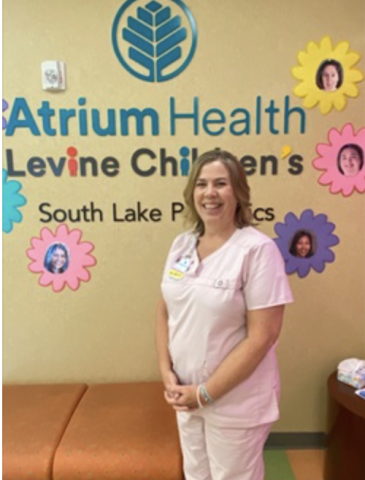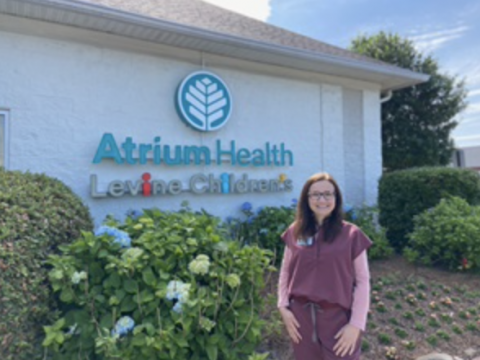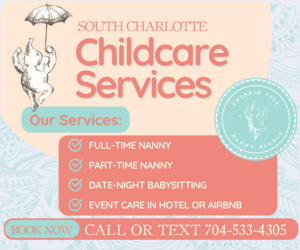"This article was previously published on Atrium Health's Daily Dose."
Our lactation consultants have seen and heard it all, so now we're having them tell it all. Get to know them and some breastfeeding advice along the way.
"Hi, mom. Here's your baby," the nurse says as she lays your newborn on your chest for skin-to-skin contact. What's next? Breastfeeding. This is when you introduce your baby to their main source of nutrition for the next six months. No pressure. While it's the most natural thing in the world, it doesn't always come naturally.
If you've taken a breastfeeding class, you at least have some knowledge of the different positions to try for the best latch and what it might feel like (which might be somewhat uncomfortable or weird in the beginning). But nothing quite prepares you for the real deal, like your baby attempting to nurse for the first time.
Fortunately, at Atrium Health, you don't have to do it alone. Atrium Health Women's Care offers customized maternity care, including breastfeeding services and support, in partnership with Atrium Health Levine Children's. Lactation consultants are available at 11 doctor's offices and three hospital locations in the Charlotte region.
What does their job entail? Assisting mothers and their families in caring for their newborn by providing nonjudgmental support for the mother-infant breastfeeding dyad.
Don't be fooled by its simple description – it's not a simple job. Their tasks include assessment, planning, intervention and evaluation of lactation support and education for postpartum mothers. Contrary to popular belief, our lactation consultants support mothers with other feeding options (like bottle feeding and formula feeding) when breastfeeding isn't an option or gets too difficult. Babies have to eat!
To say the least, it's an intimate experience. After one consult, your modesty will likely fly out the window just like your knowledge of what life was like before your precious baby entered it.
At the end of the day, every lactation consultant's goal at Atrium Health is the same – a happy and healthy mom and baby.
Breastfeeding isn't always easy. When you need help, our lactation consultants are here to support you. They offer visits in the hospital after birth, at nearby doctor's offices and virtually from some locations.
Get to Know Our Lactation Consultants
Our lactation consultant team with Atrium Health Women's Care and Atrium Health Levine Children's would like to introduce themselves – with breastfeeding facts and misconceptions and also frequently asked questions that are sure to give you a chuckle as you learn from their experiences.
1. Penelope Bridgeman
Bridgeman is a lactation consultant at Atrium Health Levine Children's Charlotte Pediatrics in Matthews. If she's not at work you can find her playing the piano, spending time outdoors or with her busy family of three children.
Bridgeman became a lactation consultant after having "wildly different" feeding experiences with each of her children.
She loves what she does for more than one reason.
"Seeing these mothers and babies meet their feeding goals and gain all the benefits of breastfeeding is truly one of my greatest joys," Bridgeman says.
A big misconception about breastfeeding is that if it comes naturally, it should come easily – but Bridgeman says that's not the case.
"Breastfeeding is a new skill for babies and first-time moms," Bridgeman says. "Although a woman's body is designed to feed their baby, that does not mean it will fall into place without any road bumps. After practice and learning, the skill will get easier for both mom and baby."
Wildest question: "Can my husband try to latch the baby so he knows what this is like?"
Her answer: "Sure," Bridgman said, while laughing. "Although your baby will be sadly disappointed! I love his interest in understanding and supporting your breastfeeding experience. A supportive partner has been shown to increase initiation and duration of breastfeeding."
2. Paige Glassman
Glassman is a lactation consultant at Atrium Health Women's Care Piedmont OB-GYN . She has been with Atrium Health since 2022 and a lactation consultant since 2019.
She loves to hike local trails with her husband and three boys.
"I became a lactation consultant because all three of my lactation stories have been different," Glassman says. "From exclusively breastfeed, to breast-pump-supplement to strictly formula due to a medical condition. This has given me perspective on how feeding plans can vary and that is okay."
Glassman says it's rewarding to reach the mother's feeding goals. "Also, the problem solver in me loves to look at all angles to discover what may be hindering the lactation experience."
Most frequently asked question: "What can I do to make more milk?"
Her answer: "First, let's see what you are currently doing," Glassman says. "Usually, the best way to make more milk is to stimulate your breast more often by breastfeeding or pumping."
3. Dana Patti
Patti joined Atrium Health in 2015, took a break, and then rejoined her teammates in 2021. She's a lactation consultant at Atrium Health Levine Children's Charlotte Pediatrics in SouthPark. She loves watching her daughter play volleyball while she's not working.
Patti also has a personal reason for becoming a lactation consultant.
"I felt driven to become a lactation consultation after watching my sister pump for her premature twins and then having my own challenges breastfeeding my late preterm daughter," Patti says.
Have we mentioned the cute babies as being a big perk of this job?
"Not only do I get to be around newborns, but I get to work with moms and dads, see their interaction with their new bundle and help make the breastfeeding process simpler for all," Patti says. "The joy on a mom's face is extremely rewarding!"
Most frequently asked question: "What can I eat to increase my breastmilk supply?"
Her answer: "Old-fashioned oats can be helpful and provide you with energy to get through your day," Patti says.
Wildest question: "Do I need to drink a lot of milk to make milk?"
Her answer: "Drinking milk does not necessarily increase milk supply but can contribute to your hydration," Patti says. "Waters, flavored or not, juices, etc. can keep you hydrated, which can therefore help your milk supply."
4. Amy Cunningham
Cunningham is a lactation consultant at Atrium Health Levine Children's South Lake Pediatrics. During her free time she enjoys cooking new recipes and nature hikes.
Cunningham says the special bond between moms and their babies is what puts 'special' in her specialty.
"It is such a healthy, natural choice, and some moms just need that extra bit of support and education to feel like they are empowered to meet their (breastfeeding) goal," Cunningham says.
'Breastfeeding is supposed to be painful' is a big misconception Cunningham often hears.
"This isn't true," Cunningham says. "If it's painful, something isn't right. We can fix that!"
Cunningham also hears that lactation consultants are against bottle feeding and formula – which she says is also false.
"We understand that there are situations that require the use of a bottle," Cunningham says. "And there are times when moms don't have enough breastmilk to meet their baby's demands."
Her advice is to slow down, rest and enjoy your baby.
"This is a short period of time and will go by so quickly," Cunningham says.
Wildest question: "How much alcohol can I drink while breastfeeding?"
Her answer: "In general, consuming one standard alcoholic beverage a day is not known to be harmful to the infant, especially if the mother waits at least two hours after a single drink before nursing," Cunningham says.
5. Tahysha "Ty" Mclain
McClain is a lactation consultant at Atrium Health Women's Care Charlotte OB-GYN in South End and Atrium Health Levine Children's Midtown Pediatrics. When she's not working, McClain is roller skating! A fun fact about her is she appeared as an extra in the film, "Step Up 2: The Streets."
McClain says her passion as a lactation consultant stems from her experience in breastfeeding her own children.
"After a little research, I discovered the racial inequalities and disparities that plague the Black communities," McClain says.
McClain believes in becoming the change you want to see in the world.
"I want to continue to help diversify the lactation profession by being a role model to women of color by showing them they have a voice in this profession, too," McClain says.
McClain's biggest piece of advice for her patients is to trust the process, your body and your baby.
Wildest question: "Am I too short to breastfeed?"
Her answer: "Height has nothing to do with your ability to breastfeed," McClain says. "Neither does color, race or ethnicity."
6. Gail Broad
Broad is a lactation consultant at Atrium Health Women's Care Union OB-GYN. When she's not traveling the world, Broad is a worker bee," as her husband calls her. She's always busy crocheting or enjoying a word puzzle.
She's passionate about what she does.
"I love supporting and showing families the potential in achieving their individual breastfeeding goals," Broad says.
Some people believe that lactation consultants don't like formula and breastfeeding is the only way to go.
"This isn't true," Broad says. "Everyone's breastfeeding journey looks different."
Broad says a common misconception is breastfeeding appointments are just for the mom.
"It's for the mom, her baby and significant other/support person to be able to evaluate the whole breastfeeding dynamic," Broad says.
Most frequently asked question: "How do I know how much milk my baby is getting?"
Her answer: "Your baby appears calm and satisfied when they come off the breast on their own at the end of feeds, and they're producing enough wet and dirty diapers," Broad says. "These are signs your baby is getting enough milk."
7. Randi Purvis
Purvis joined Atrium Health in March 2023 as a lactation consultant at Atrium Health Myers Park OB-GYN and Atrium Health NorthPark OB-GYN. When she is not at work she enjoys traveling, hiking and photography.
She became a lactation consultant after watching her close friend struggle to breastfeed and the mental toll it took on her.
"It broke my heart to watch her beat herself up that it didn't come naturally to her like people said it would," Purvis says. "I only wish I could have been more help at that time to show her she was an amazing mom capable of anything with a little help, which is totally normal!"
Purvis developed a passion for maternal child health during her schooling and loves empowering moms by helping them meet their goals, no matter what they are.
The biggest misconception she hears about breastfeeding is that nipple damage is "just part of breastfeeding." If breastfeeding is causing you pain or nipple damage, then something isn't right, and you should ask for help!
Most frequently asked question: How do I know my baby is getting enough?
Her answer: "Your baby should seem calm and content after feedings and not giving any more hunger cues," Purvis says. "You can monitor his/her diapers and weight at doctor's appointments. You can also come in for a lactation appointment to do an intake weight if you have any concerns.
8. Laura Stewart
She's a lactation consultant at Atrium Health Levine Children's University Pediatrics for almost one year. When she's not traveling the world, Gail is a 'worker bee' as her husband calls her – she's always busy crocheting or enjoying a word puzzle.
She's passionate about what she does. "I love supporting and showing families the potential in achieving their individual breastfeeding goals," Gail says.
Some people believe that lactation consultants don't like formula and breastfeeding is the only way to go. "This isn't true. Everyone's breastfeeding journey looks different."
A common misconception is breastfeeding appointments are just for the mom. "It's for both the mom and her baby to assess how the two are working together."
Most frequently asked question: "How do I know how much milk my baby is getting?"
Her answer: "Your baby appears calm and satisfied when they come off the breast on their own at the end of feeds, and they're producing enough wet and dirty diapers. These are signs your baby is getting enough milk."
9. Sierra Wilson
Wilson is a lactation consultant at Atrium Health Levine Children's University Pediatrics. She enjoys being outdoors and spending time with loved ones and her patients.
"I'm passionate about my line of work, just knowing I'm helping make someone's life a bit easier and instilling confidence into mother's during a very vulnerable time," Wilson says.
She assures new parents they are not alone.
"I let all my families know that, as humans, we can only do what we can and to not put an expectation or standard on their breastfeeding journey," Wilson explains. "I assure them I am here every step of the way and to take things one day at a time."
Wilson adds, "We do not have a 'cookie-cutter' idea of what a 'proper breastfeeding journey' should look like. We meet patients where their goals are and support them in trying to help them achieve those goals."
Most frequently asked question: "Is the baby getting any milk, and if so, how much is enough?"
Her answer: "Watch the infant's body language in an awake state to know if the baby is satiated," Stewart says. "Rely on output, meaning, 'What goes in, has to come out.' If your infant is making good output, we know they are getting the proper amount of intake."
10. Irina Sukhanova
Sukhanova is a lactation consultant at Atrium Health Levine Children's Suburban Pediatrics. In her free time, she enjoys reading, spending time in nature, traveling, and learning about new cultures, and she just loves her profession.
"I feel privileged to play a part in supporting and nurturing the beautiful bond between mothers and their babies," Sukhanova says. "The satisfaction of empowering mothers to overcome breastfeeding challenges and meet their set goals makes every day as a lactation consultant truly fulfilling and gratifying."
She wants to encourage families to meet with a lactation consultant sooner rather than later.
"Many families wait to see a lactation consultant until they start having problems," Sukhanova says. "It's much better to schedule an appointment before your baby is born. Prenatal consultation can prepare you to avoid common mistakes and set the stage for a more confident, informed and successful breastfeeding journey."
Wildest question: "Is it true that drinking beer can help me make more milk?"
Her answer: "A healthy diet and hydration are very important to new moms," Sukhanova explains. "The barley and hops used to make beer can stimulate milk production, but the alcohol has the opposite effect on your supply, and it can have adverse effects on your baby. You can make barley water as an alternative to drinking beer, but more importantly practicing frequent and effective breastfeeding or pumping sessions are essential for optimal milk production."
See AtriumHealth.org/Breastfeeding for lactation services and breastfeeding support.


































